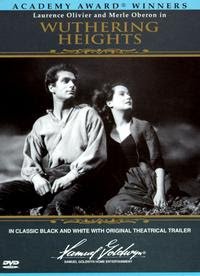 On the theme of dysfunctional families, no film explores the depths of dysfunction quite like the 1939 version of Wuthering Heights. I watched it last night while catching up with the laundry. (There always seems to be a mountain of laundry when returning from a trip.) So I folded clothes and watched what is perhaps one of the greatest love stories ever captured on film, great because it is more than just a love story; it is a portrait of the long term results of alcoholism and child abuse. Based, of course, upon the novel of the same name, the film stops after the first few chapters.The book, however, goes on to show with immense psychological detail how the abused Heathcliff himself becomes an abuser and replicates, to the best of his ability, the circumstances in which he was mistreated. The film captures in a short but intense manner the brilliance of the original story-telling.
On the theme of dysfunctional families, no film explores the depths of dysfunction quite like the 1939 version of Wuthering Heights. I watched it last night while catching up with the laundry. (There always seems to be a mountain of laundry when returning from a trip.) So I folded clothes and watched what is perhaps one of the greatest love stories ever captured on film, great because it is more than just a love story; it is a portrait of the long term results of alcoholism and child abuse. Based, of course, upon the novel of the same name, the film stops after the first few chapters.The book, however, goes on to show with immense psychological detail how the abused Heathcliff himself becomes an abuser and replicates, to the best of his ability, the circumstances in which he was mistreated. The film captures in a short but intense manner the brilliance of the original story-telling.In spite of the all the melodrama, the 1939 Wuthering Heights is a subtle film compared to the remakes. There are no sex or rape scenes, little bloodshed, just phenomenal acting and a stirring score. When Hindley places his muddy boot on Heathcliff's hands, one feels the humiliation, the degradation. And no R-rated love scene can compare to the passion with which Catherine rips off her fine frock so she can don her usual shabby attire and dash off to join Heathcliff on the moors.
The obsessive love between Catherine and Heathcliff is the result of the bonding which occurred when they were children in a brutal situation, with no one but each other to turn to for help. Although Catherine loves Heathcliff, her desperation to escape from her alcoholic brother dominates all other emotions. She marries wealthy Edgar for material security and seems to be happy, until Heathcliff comes back. The division in her soul destroys her; in the book she dies giving birth, so tormented that not even the love for her child gives her any peace or hope.
Throughout both the book and the movie are the recurring mentions of the devil, of hell, of witchcraft and curses, so that one has the distinct impression that the religion of the characters in more Manichean than Christian. The evil spirals into consuming jealousy and hatred. No sins of the flesh are committed, that anyone is aware of, although suppressed passion simmers in every chapter. The tempestuous climate of the moors reflects the inner tumults. The core of the evil is not in the wildness of the elements but in the addictive behaviors of the Earnshaw family. Heathcliff is as addicted to his anger and hatred for all who have injured him as much as Hindley is addicted to his drink. Heathcliff's inability to forgive, more than his thwarted love for Catherine, is what destroys most of the main characters. The film provides a searing study of the evil that is unleashed when people cling to the past. It also shows, in the final ethereal shot, how love can transcend time and space.
Oh cripe, Sir Laurence Olivier was fallen in love with right then, right there.
ReplyDelete"I don't just love Heathcliff-- I AM Heathcliff!" Ah, I'd wondered what it would be like to feel that. I found out. Oh gosh.. you're such a romantic, EMV.
:-)
Ha, ha, I guess all true romantics find out sooner or later....
ReplyDelete+JMJ+
ReplyDeleteWell, I'm glad that someone on St. Blog's likes Wuthering Heights! A few years ago, the only ones mentioning it were MamaT of the Summa Mamas and Stephen Riddle of Flos Carmeli--and they both couldn't stand it! :(
Dear Enbrethiliel, that is interesting, honey, and a bit perplexing! Oh, well, to each his own. Art and literature are such amazing sources of life lessons to me, to be viewed with a well-formed conscience.
ReplyDeleteActually, dear, this blog is not a member of St. Blogs, with all due respect to those devout and scholarly bloggers.
Another momentous movie from 1939.
ReplyDeleteI've read the book twice but have yet to see a film adaptation! I know PBS's "Masterpiece Theater" did a two part adaptation of "Wuthering Heights" in the 1990s and followed the book.
ReplyDeleteI've read the novels by the Bronte sisters and have preference for Anne. Her book "Tenant of Wildfell Hall" was also adapted for PBS.